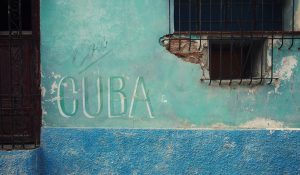Perspective:
By Louis A. Perez Jr.

On May 29, the United States removed Cuba from the list of “state sponsors of terrorism” as one more step toward normalization of relations between the two countries. But, historically, it is the United States that has sponsored terrorism against Cuba.
The U.S. designation of Cuba as a state sponsor of terror dates back to the early 1980s due to Cuban support of guerrilla movements in Central America. The label was ironic, since the United States engaged in a program of extralegal paramilitary operations as part of failed attempts at Cuban regime change all through the early 1960s. These efforts included the Bay of Pigs invasion, scores of assassination attempts against Cuban leaders and years of covert operations.
The intent was to bring about the collapse of the Cuban government, the CIA explained in 1963, through a “strategy of economic strangulation to weaken and undermine the regime.”
One planned operation, the CIA detailed, was designed to “conduct major sabotage operations targets against Cuban industry and public utilities.” Another CIA project included “the contamination of fuels and lubricants,” as well as “the introduction of foreign material into moving parts of machinery.”
The Department of Defense similarly designed projects to “accomplish the objective of economic harassment.” One plan specifically directed that “fuel and food supplies should be sabotaged,” while another directive prescribed “major acts of sabotage on shipping destined for Cuba and on key installations in Cuba.”
The United States especially targeted sugar production, Cuba’s principal source of foreign exchange. Covert operations involved planned arson of cane fields, sabotage of sugar machinery, and acts of chemical warfare, including the spreading of chemicals in sugarcane fields to sicken Cuban cane cutters.
In one instance, the Defense Department contemplated military exercises made to appear as preparations for a U.S. invasion, to be timed with the sugar harvest to force Cuba to mobilize the civilian militia and divert vast numbers of workers away from the harvest. Alexander Haig, secretary of state under President Reagan, later acknowledged the organization of three or four “major operations” against Cuba every month during the 1960s.
The Handbook of International Law defines state-sponsored terrorism as the act “of a state sheltering, training, financing or supplying arms to enable terrorists, often foreign, to attack another state or its nationals.” U.S. covert operations against Cuba during the early 1960s would most assuredly rise to the level of acts of state-sponsored terrorism.
Writing years later, presidential advisor Richard Goodwin, participant in the planning of covert operations against Cuba under the Kennedy and Johnson administrations, acknowledged that the U.S. efforts to overthrow Fidel Castro “included assassination, sabotage of the Cuban economy, guerrilla infiltration — a kind of state-sponsored terrorism.”
It’s tempting to accede to President Obama’s oft-repeated request to look forward, and not back. But it should come as no surprise in the coming months, as Cuba and the United States move closer to normal relations, as both countries begin to exchange claims for reparations for deeds and misdeeds each committed against the other over the past half century, if Cuba were to present to the United States a bill for damages suffered during the early 1960s as a victim of what Goodwin called “a kind of state-sponsored terrorism.”
Louis A. Perez Jr. is the J. Carlyle Sitterson Professor of History and director of the Institute for the Study of the Americas at the University of North Carolina at Chapel Hill. He is the author of several books on Cuba, including, most recently, “The Structure of Cuban History: Meanings and Purpose of the Past” (2013). He can be reached at pmproj@progressive.org. Reprinted from The Progressive (http://www.progressive.org)